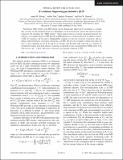R evolution: Improving perturbative QCD
Author(s)
Hoang, Andre H.; Jain, Ambar; Scimemi, Ignazio; Stewart, Iain
DownloadHoang-2010-R evolution_ Improvi.pdf (323.7Kb)
PUBLISHER_POLICY
Publisher Policy
Article is made available in accordance with the publisher's policy and may be subject to US copyright law. Please refer to the publisher's site for terms of use.
Terms of use
Metadata
Show full item recordAbstract
Perturbative QCD results in the MS̅ scheme can be dramatically improved by switching to a scheme that accounts for the dominant power law dependence on the factorization scale in the operator product expansion. We introduce the “MSR scheme” which achieves this in a Lorentz and gauge invariant way and has a very simple relation to MS̅ . Results in MSR depend on a cutoff parameter R, in addition to the μ of MS̅ . R variations can be used to independently estimate (i.) the size of power corrections, and (ii.) higher-order perturbative corrections (much like μ in MS̅ ). We give two examples at three-loop order, the ratio of mass splittings in the B*-B and D*-D systems, and the Ellis-Jaffe sum rule as a function of momentum transfer Q in deep inelastic scattering. Comparing to data, the perturbative MSR results work well even for Q∼1 GeV, and power corrections are reduced compared to MS̅ .
Date issued
2010-07Department
Massachusetts Institute of Technology. Center for Theoretical Physics; Massachusetts Institute of Technology. Department of PhysicsJournal
Physical Review D
Publisher
American Physical Society
Citation
Hoang, Andre H. et al. "." Physical Review D 82.1 (2010): 011501. © 2010 The American Physical Society
Version: Final published version
ISSN
1550-7998
1550-2368